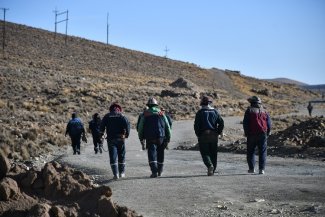
Ana Ivanova, one of the protagonists of Las Herederas, meets the press during the film’s premiere in Asunción, Paraguay.
Loneliness, class prejudice and desire are all intermingled in Las Herederas (The Heiresses), a new Paraguayan film that has won widespread acclaim and a number of international accolades such as the Silver Bear and Alfred Bauer Prize at the Berlin International Film Festival and a 2018 viewers’ choice award for the most popular LGBTI feature film at the 32nd Teddy Awards. It was Paraguay’s candidate for this year’s Oscars in the Best Foreign Language Film category.
“[It] almost subliminally alerts you to complexities of sexuality and status that many films would prefer to simplify, says the New York Times’ review of the film. “[Director Marcelo] Martinessi shrewdly combines subtlety, melancholy, satirical observation and candour about sex,” wrote Guardian film critic Peter Bradshaw.
The film is a drama that has moments of brilliant humour. It shows the lives of Chela (played by Ana Brun) and Chiquita (Margarita Irún), both from wealthy families, who have been a couple for 30 years. Financially they have fallen on hard times, and they have to sell their inherited possessions. When Chiquita is sent to prison for fraud, Chela finds herself alone and facing a new reality: driving their old Mercedes again after years of not taking the wheel, working as an impromptu taxi driver for a group of well-off elderly women. This is how she comes across Angy (Ana Ivanova), a much younger woman, with whom she feels a strong connection, creating inner turmoil, filling her with doubts but also a sense of being alive.
Las Herederas has been shown at some 50 film festivals around the world and is still being shown on commercial screens in many other countries, both in Europe and on the American continent. However, the film’s world premiere was not in Paraguay but in Germany, in February 2018 during the 68th Berlin International Film Festival. This is because Paraguay – Latin America’s most Catholic country, according to pollsters Latinobarómetro – may not be the most receptive place to show a film whose lead characters are lesbians. A small group of religious extremists, helped by the inaction of the authorities, have sent floods of messages protesting against the film via WhatsApp.
Expressing homophobic views is commonplace within the Paraguayan political class.
Former President Horacio Cartes once said on the radio that he would shoot himself in the genitals if his son turned out to be gay. There has been a steady stream of homophobic messages by the state ever since the dictatorship of Alfredo Stroessner Matiauda (1954-1989), when the police and the government led the persecution of 108 people for being “suspected homosexuals”. The number is still used pejoratively to refer to the LGBTI population. Recently the Paraguayan public prosecutor’s office brought charges against Bruno A. Comas, a young gay artist, for “acts of exhibitionism” after he gave a public performance to denounce violence and discrimination against the LGBTI community. If he is found guilty, he could face up to a year in prison.
Two people of the same sex kissing each other or holding hands in public is still uncommon today in Paraguay, perhaps due to the strong likelihood that they will face police harassment in the name of protecting ‘public decency’, warns the local NGO Somosgay on their website.
A crusade against “gender ideology”
Shortly before the premiere of Las Herederas in Berlin, the then Education Minister from the ruling conservative Colorado Party, Entrique Riera, heightened tensions further by promoting, together with evangelical churches and Catholic bishops, a crusade against sex education and gender equality in schools.
Just a few months earlier, the minister had publicly promised the churches that, if necessary, he would “burn the books” on “gender ideology” in a public square so that they could put their trust in him.
Riera, who turned down requests for an interview with Equal Times, later tried to soften his words during a radio announcement, saying it had been an exaggeration. But 24 hours after that announcement, he issued a decree prohibiting “the dissemination and use of printed or digital materials referring to gender theory and/or ideology” throughout the country’s education system, both public and private. The initiative only served to worsen the already sparse formal sex education in a country which has one of the worst education systems in the world.
Days after the publication of the Ministry of Education’s decree, when civil servants from the Paraguayan government’s social department were preparing leaflets to present a report on how to end gender-based violence, their boss warned them “be careful with the word ‘gender’”. She then made them remove it from the announcement, one of the workers (who asked to remain anonymous) told Equal Times.
Today, thanks to an investigation by the Paraguayan news outlet El Surti, we also know that the government gave US$300,000 to an evangelical NGO called Decisions. The organisation is dedicated to spreading false information on sexuality in lectures to thousands of students in hundreds of public and private colleges in Paraguay. It gives them materials that question the use of condoms to prevent HIV infection and pregnancy, and it also promotes supposed conversion therapies for gay people.
The continental premiere of Las Herederas did not take place in Paraguay either, but rather in Colombia (on 1 March 2018 during the 58th Cartagena de Indias International Film Festival), where it was awarded two prizes.
The film’s international success was such that the fervent populist nationalism of some Paraguayan politicians motivated some public institutions to recognise the project’s success, even though they had not seen the film. The Asunción Town Council unanimously agreed to declare the film’s cast and crew “Favourite Children of the City of Asunción”. The Senate decided to give an award to the director, Marcelo Marinessi and to the actress Ana Brun.
That day in the Asunción Senate, the ceremony to honour them illustrated how culture is usually treated by the state in Paraguay. Nobody applauded the artists when they entered their country’s Congress. On the contrary, they crossed paths with a row of legislators from the Colorado Party, the same party that supported the dictatorship, who were trying leave a debate on an anti-corruption law.
In the chamber, amid murmurs, only about half of Paraguay’s 45 senators stayed to honour director Marcelo Martinessi, producer Sebastián Peña Escobar and the actresses Ana Brun, Margarita Irún and Ana Ivanova. When a few legislators tried to keep their composure and greet Brun after her speech, a sentence uttered by one senator rippled through the chamber.
“These lesbians are an attack on the family,” proclaimed Zulma Gómez, a senator from the centre-right opposition Liberal Party, who without blushing continued to spit out homophobic phrases as she left the room.
“I hope she [the senator] sees the film and pays for her ticket like anybody else, because what I said depicts her more than us,” said Martinessa when interviewed by Equal Times.
A new perspective
On 5 April last year the film – which shows the story of two lesbian women, without stigma and without depicting them as victims – finally reached Asunción. There, the most extremist representatives of the self-styled ‘pro-life’ movement, such as the Association of Users and Consumers of Paraguay (Asucop), had been promoting criticism against the film for months.
“When that film comes [to Paraguay], of course we will shoot it down in flames,” said a representative of the organisation on the radio. The organisation is not recognised by the Paraguayan government, but it has media influence thanks to the enormous space offered by conservative commentators.
The premiere was a success, despite the authorities and the boycott by some groups, especially considering that this is a country with an incipient film industry, which has been invisible and excluded from the continent’s audio-visual narrative, a country that lived through the longest dictatorship in Latin America and today seeks to explain itself to itself, from a new perspective.
The film’s showing in Paraguay was a celebration of diversity. There were not only actors and actresses. Social leaders from poor neighbourhoods, artists of all kinds, and activists mingled with journalists, diplomats and politicians from the cultural universe of Asunción and members of the film industry who walked the red carpet.
The militants of Aireana, a lesbian rights group, paraded with posters that reminded everyone that lesbians deprived of their liberty in the largest women’s prison in Paraguay, the Good Shepherd, reported that they were not allowed to have intimate visits from their partners.
Las Herederas was born out of a time of contradictions in the life of Martinessi and turbulent times in Paraguay. He was the first director of Paraguay’s nascent public television industry and experienced at close hand the abrupt end of the government of Fernando Lugo (2008-2012), the only progressive government of the current democracy which ended with a parliamentary trial brought about by his conservative allies and the opposition. It was a process described as “breaking the constitutional order” by Mercosur and other international organisations, and was one that brought to a standstill the social policies undertaken by the Lugo team.
Lilian Soto, leader of the feminist party of Paraguay, Kuña Pyrenda, said that the work was “a beautiful film and a tough one, because it holds up a mirror to Paraguayan society. It shows us class prejudice and social hypocrisy, it shows that in the face of staleness, gloom and oppression there is resistance, searching, desire, solidarity and a breath of fresh air, and that there is always a way out. It is a tribute to women,” concluded Soto.









